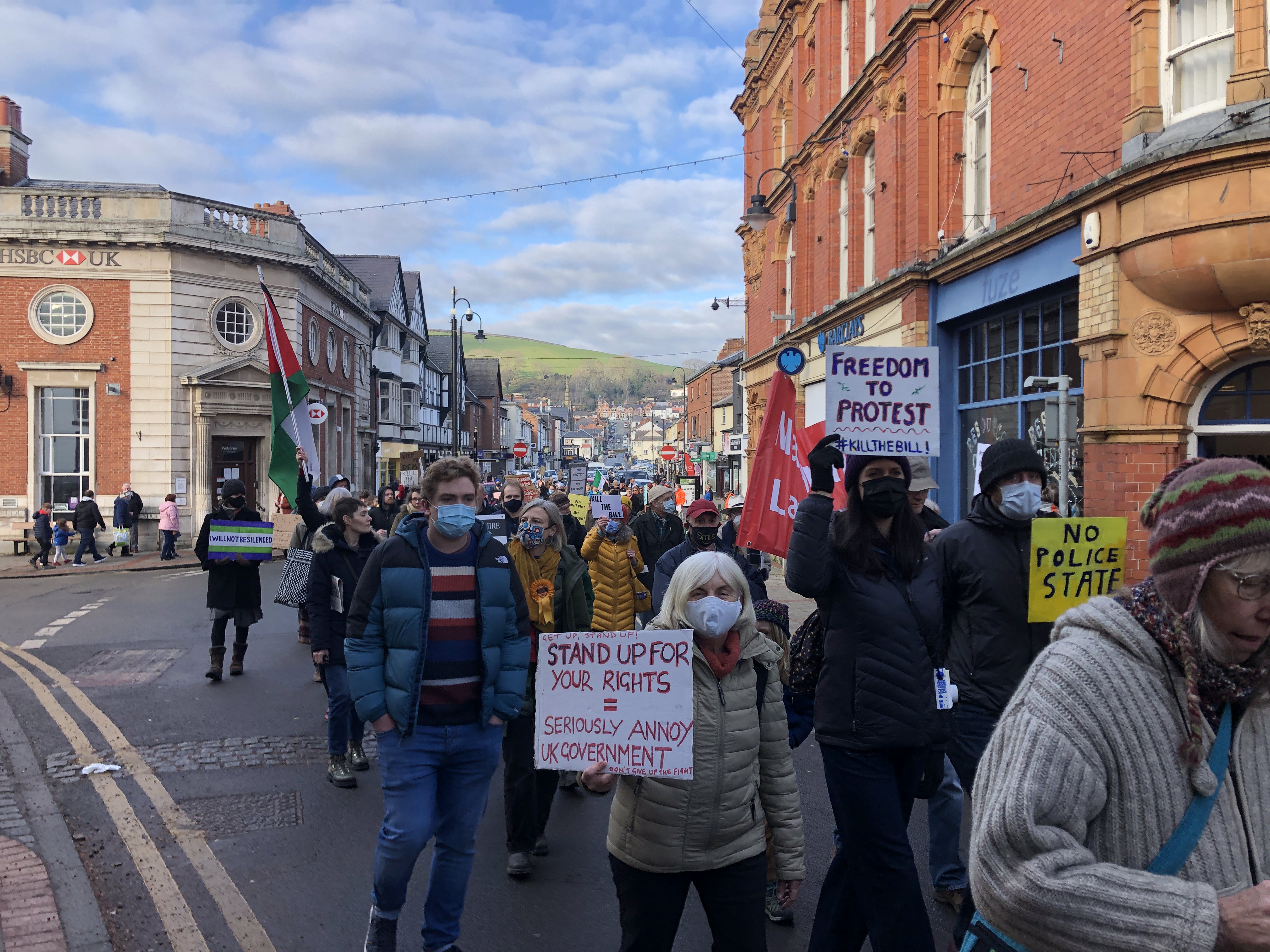
Newtown -‘Kill the Bill’ Protesters March Through Rural Welsh Town Against Tory Attack on Dissent
More than 100 people converged in Newtown Saturday to protest against the UK Government’s authoritarian ‘Police, Crime, Sentencing and Courts’ (PCSC) Bill, a piece of legislation which will criminalise important acts of protest and rebellion, and tear apart traveller and gypsy communities.
The large crowd, gathered in Newtown High Street around noon on Saturday 15th January as part of a day of action against the Bill, often referred to simply as the Police and Crime Bill, as it nears completion to become law.
Protesters, pictured below, took over the road and marched around the town led by a band of drummers, before gathering in the park to hear speeches over a PA system. Newtown is the largest town in the rural county of Powys, with a population of just 13,000.
The Police and Crime Bill will shortly leave the House of Lords on its way to becoming a completed Act of Parliament, but some members of the Lords, such as the Green’s Jenny Jones, are pusing for last minute amendments against some of the Bill’s most draconian elements.
The ‘Kill the Bill’ movement erupted in early 2021, after images circulated of police pinning women to the ground because they had attended a candlelit vigl for Sarah Everard, the woman brutally murdered by a serving police officer.
As well as giving police additional power to stop protests happening if they are deemed too noisy, the human rights groups Liberty has also warned that “a vast array of [individual] protests may fall foul of an offence that carries a sentence of up to ten years imprisonment.”
Amendments to the Bill in late 2021 went even further, giving police new powers to search any member of the public “whether or not the constable has any grounds for suspecting that the person… is carrying a prohibited object”. People who are deemed to be blocking such a stop and search could face jail time of up to 51 weeks or a fine. People could also get the same punishment for ‘locking on,’ a protest tactic used throughout history.
There are also new laws around encampments which human rights group Liberty say “enact a direct attack on the way of life for many in these [Gypsy, Roma and Traveller] communities.”
Ann-Marie Evans, an activist for Gypsy, Roma and Traveller rights, was one of those addressed the crowd in Newtown on Saturday:
‘When I was a child, as strikes raged and interest rates soared, many people had their homes repossessed,” she said.
“That’s why my parents sold their house and bought us a boat. My parents and I would have been criminalised by section 4 of this PCSC Bill.”
Another speaker referenced a plaque from the town they grew up dedicated to the workers shot in the 1842 Chartist uprising. It read:
“Remember that progress towards justice and democracy has not been achieved without great sacrifice.
Remember to defend vigorously the rights given to you and strive to enhance those rights for those who follow.”
“The PCSC Bill must be resisted,” they said. “The torch is passed from previous generations to us. Oppose the bills. Keep protesting. Our future and the future of our planet depend on it.”
One woman from the Montgomeryshire Palestine Solidarity Campaign highlighted that in the 12 months since the group had formed, it had held a number of protests in the area.
“Our right to carry out such peaceful demonstrations, to inform people who are willing to listen, is under threat should this legislation be passed,” she said.
David France, an Extinction Rebellion activist, told the crowd that “Boris Johnson’s Government knows they’re too corrupt to stay in power legitimately – just look at the [lockdown] party fiasco – so they’re basically breaking democracy so they can continue to profit from their positions, regardless of public opinion.”
Groups who mobilised or spoke at the Newtown protest included Extinction Rebellion, Plaid Cymru Maldwy, The Greens, Montgomeryshire Labour Party, the Palestine Solidarity Campaign, Lib Dems and others. Montgomeryshire Tory MP Craig Williams was invited to attend the gathering but declined to respond.
Speakers also referenced the UK Government’s Nationality and Borders Bill, which criminalises asylum seekers and those that help them, as part of a wider offensive by the Tory party and specifically Home Secretary Priti Patel.
Kill the Bill protests were also held in Cardiff and Swansea on Saturday and in Bangor a week earlier, pictured below. Several protests were also held across England. Police and Crime is devolved in Scotland and in Northern Ireland, so the Bill will largely not apply there, though some parts will do.
If the Bill passes, as it is expected to, it will mean the police have sweeping new powers to stifle dissent.
Many in the movement have warned against demoralisation, however, and say the Bill must become unenforceable through mass protests held against a Tory government which looks less stable now than at any time since the General Election.
One prospect on the horizon is demonstrations held against the soaring cost of living crisis, which the government would likely find politically difficult to suppress.
*All images courtesy of ‘Kill the Bill’ campaigns.


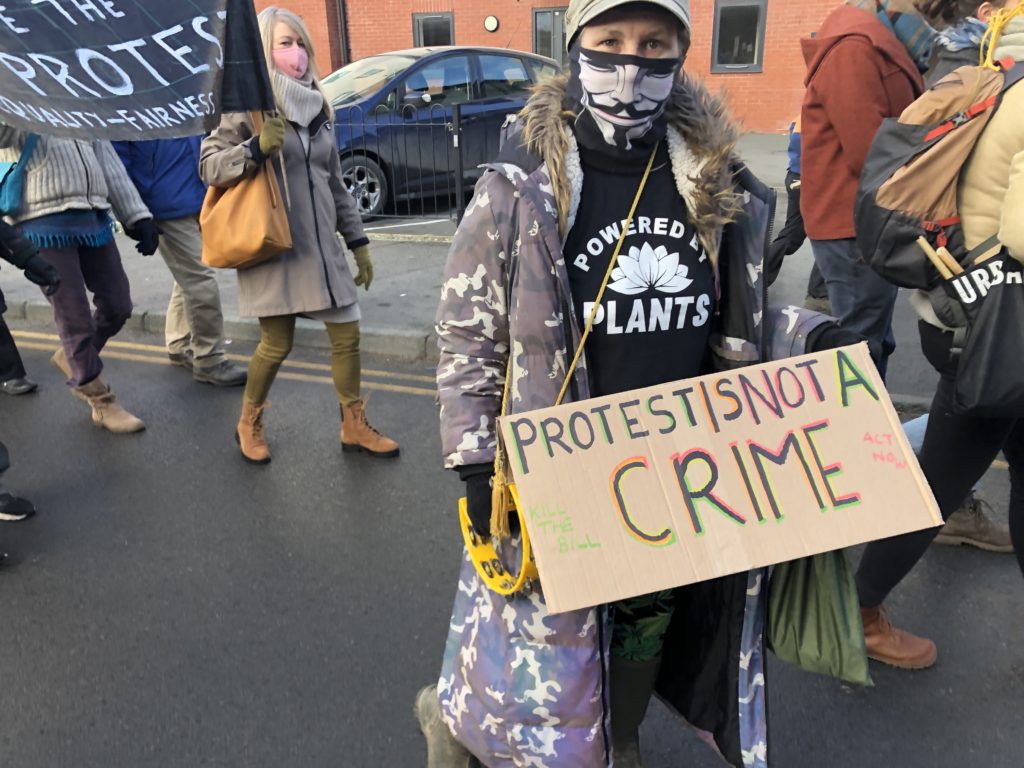
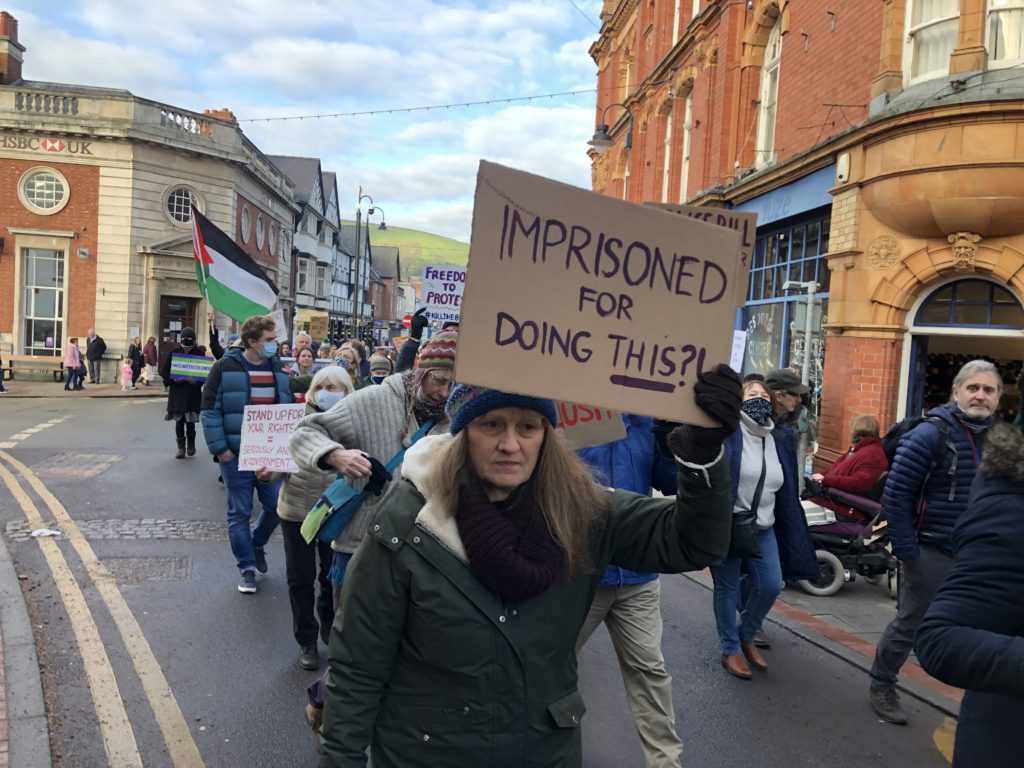
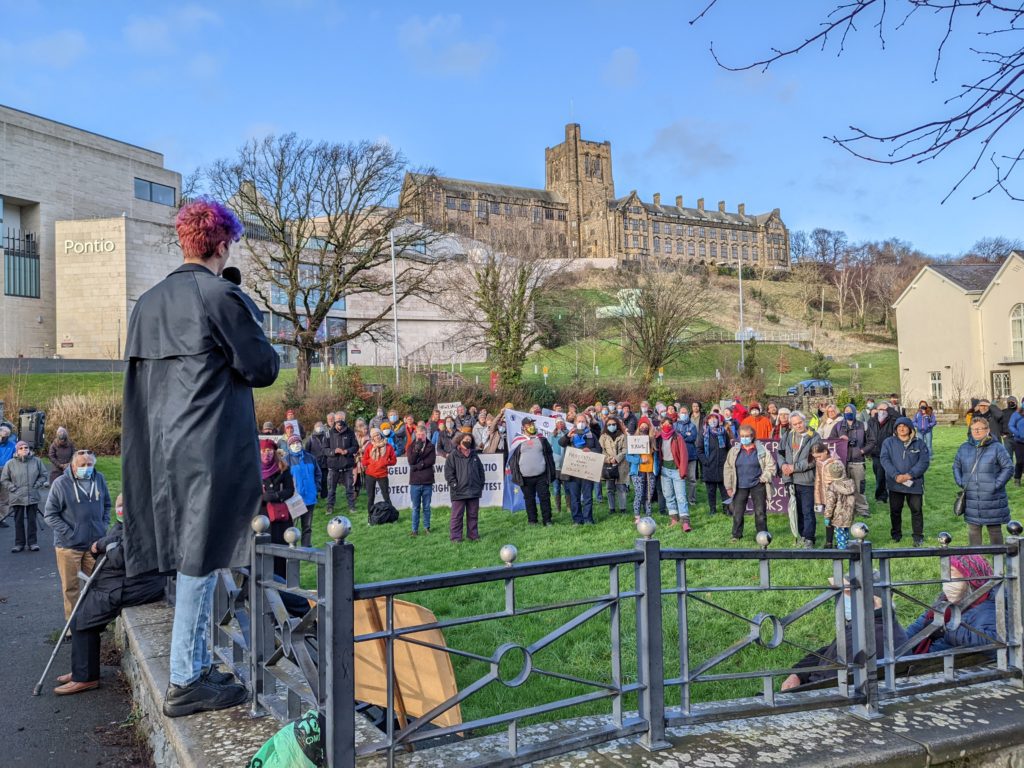
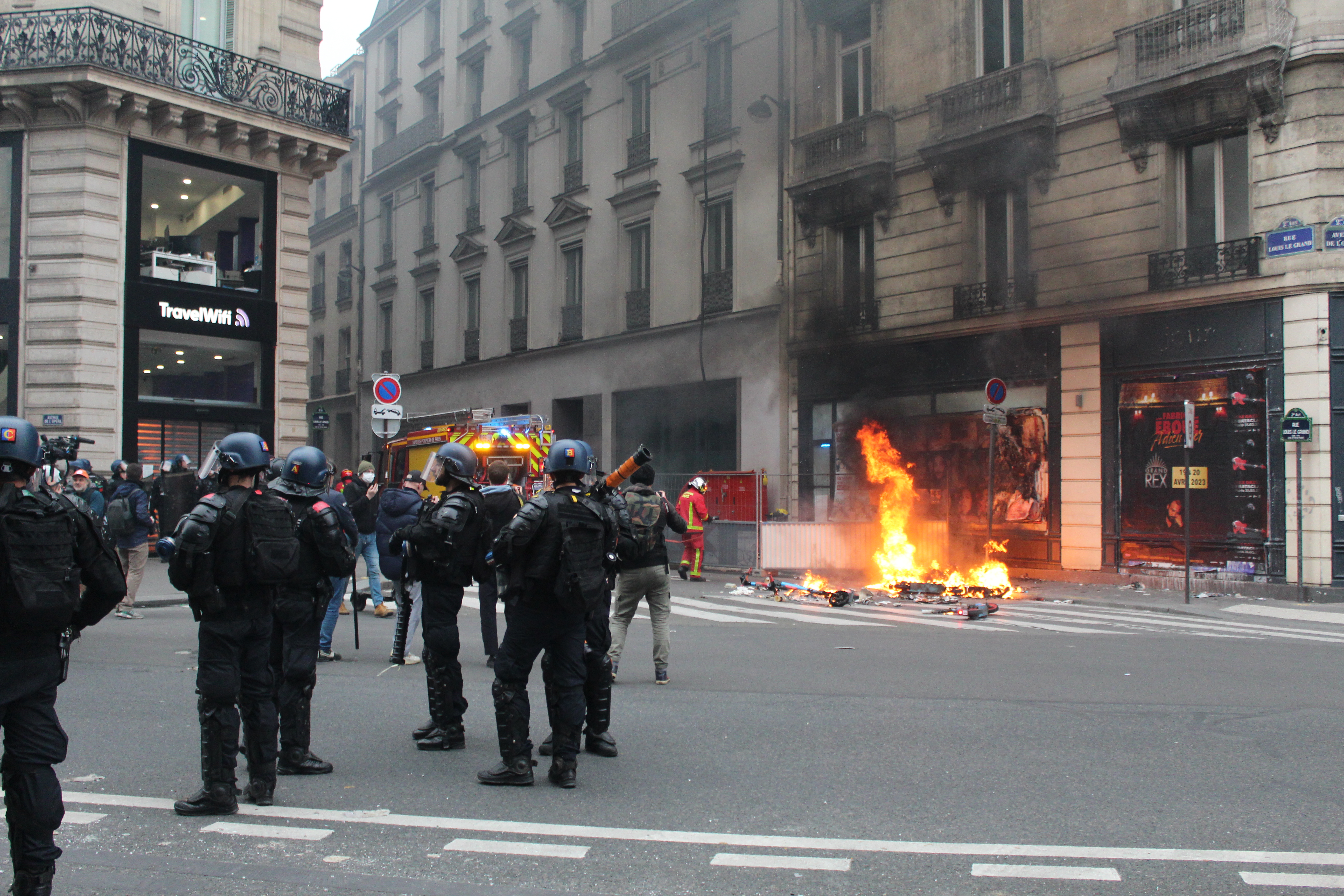
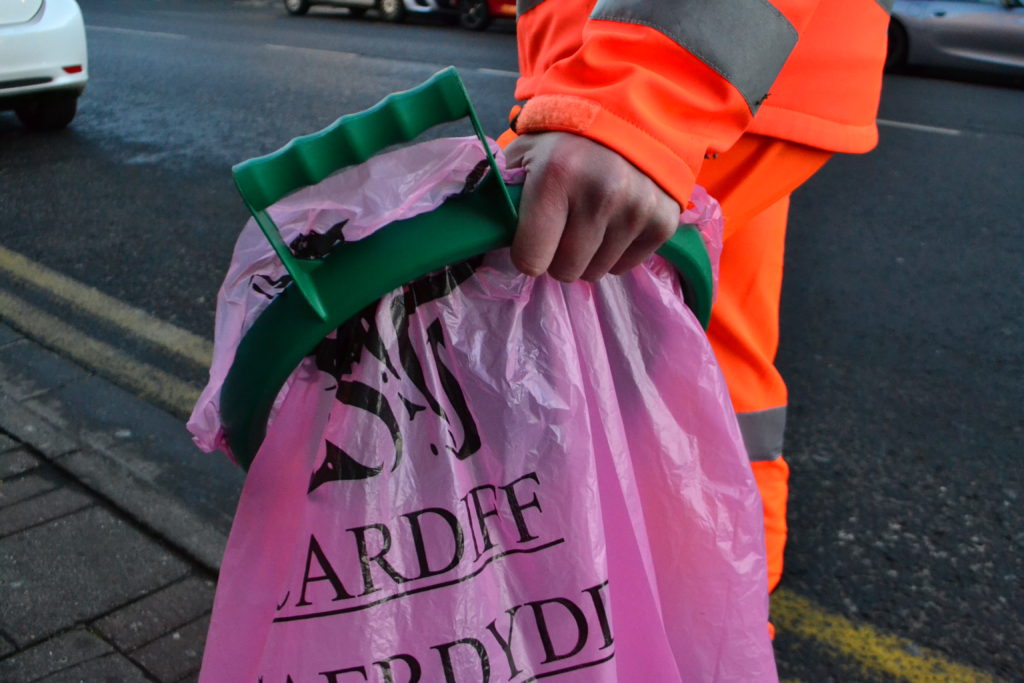
1 Comment
Comments are closed.